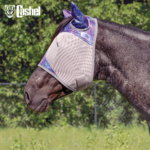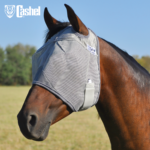Like you, your senior horse can lose his ability to detect sound as he ages. Age-related hearing loss in humans begins at about age 20 (roughly the same point as age 5 for a horse), starting with the higher frequency sounds and working down the scale. High-frequency hearing loss isn?t generally obvious in humans until it’s accumulated to the degree that it affects day-to-day functioning, usually sometime after the age of 50 (roughly equivalent to 15 years old for a horse). Horses have a wider horse hearing range than humans (normal human range is 100 hertz to 15,000 Hz; normal horse hearing range exceeds 25,000 Hz), so your senior horse can lose more of his hearing range before you notice a lack of response to sounds you can hear.

If you suspect a hearing loss in your senior horse (he’s unusually slow to respond to your voice or standard barn sounds, and/or he’s become easy to startle because he doesn’t appear to hear your approach), administer the ?Quick Hearing Test,? below. Consult your veterinarian with your results. Though currently the veterinary community lacks a way to compensate for age-related horse hearing loss, your vet might find a simple (and simple-to-fix) cause, such as tick infestation, ear mites, and ear infections, all of which can be treated quite successfully.
Whatever the cause, if your senior horse has a hearing loss, you’ll need to make some management changes for safety. Even if his horse hearing is fine, these practices are a good idea:
• Always speak to him or otherwise get his attention before you approach, so you don’t startle him.
• Be sure he hears your alert, by monitoring the direction of his ears?one or both should flick toward you.
• Check his ears regularly for signs of insect infestation or infection. Look for redness, scratching, and/or hair loss on or around the ear that could indicate rubbing.
Quick Hearing Test
If your horse has perfect hearing, he probably can perceive all the same sounds you can (if your hearing is normal), plus higher-frequency (ultrasonic) sounds that to the human ear are imperceptible, such as some of the highest wavelengths of an urgent whinny.
If your senior horse is hearing-impaired, his ability to hear high-frequency sounds will be the first to suffer, particularly if they?re soft. Here’s a test you can use to screen your horse for high-frequency, low-amplitude hearing loss.
What you’ll need:
• A variety of noisemakers: a plastic grocery bag, several twigs to snap, and a ?silent? (to you) dog-training whistle. The bag and breaking twigs will emit a wide range of sounds, including high-frequency ones. The dog whistle emits high-frequency sounds that you can’t hear.
• A familiar-to-your-horse stall, or other small enclosure, that’s free of wind noise, traffic noise, and other such audio distractions. Remove any feed?chewing hay or grain will adversely affect your horse’s ability to hear. (Just as chewing potato chips affects yours.)
1. Put your horse in the stall or enclosure. Stand at least 10 feet behind him (out of kicking range). Remain there until he ignores you. Then, with minimal movement (so you don’t evoke a visual response instead of an auditory one), make some soft stimulus sounds: Crinkle the bag, snap the twigs, blow several blasts on the dog whistle. Wait a minute or so between each, so he won?t figure out the sounds are coming from you and ignore them.
2. Evaluate your horse’s reactions. You?ll know he’s heard a sound if he flicks an ear toward you (or spooks). If he fails to react to the bags and twigs, he could have a profound hearing loss. (Or, he may have chosen to ignore the noise!) If he doesn’t react to the dog whistle, he could have some high-frequency hearing loss. Consult your vet if you suspect any degree of hearing loss.
From Hands-On Senior Horse Care by Karen E.N. Hayes, DVM, MS, & Sue M. Copeland





